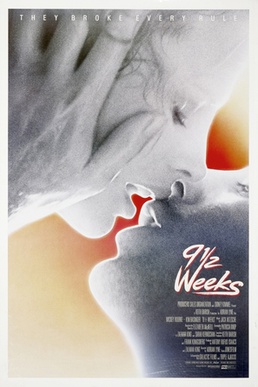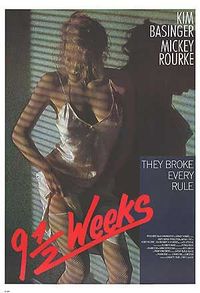9 1/2 weeks
 (movie poster) | ||
| Theme/Genre | Erotic romantic drama film | |
| Starring |
| |
| Directed by | Adrian Lyne | |
| Produced by | Mark Damon Sidney Kimmel | |
| Distributed by | MGM/UA Entertainment Co. | |
| Released | February 14, 1986 | |
| Runtime | 117 mins | |
| Budget | $17 million | |
| Gross | $100 million | |
| Followed by | *Another 9½ Weeks (1997) *aka Another 9 1/2 Weeks *The First 9 1/2 Weeks (1998) *12 weeks (2015) (Short) *912 Weeks (2013) (Short) *2 Weeks (2013) (TV Mini Series) *32 Weeks (2020) | |
| Notes | ||
| IMDB Info | 0091635 on IMDb | |
| ASIN | B008XFJEE2 | |
9 1⁄2 Weeks is a 1986 American erotic romantic drama film directed by Adrian Lyne with a screenplay by Sarah Kernochan, Zalman King, and Patricia Louisianna Knop. The film is based on the 1978 memoir of the same name by Austrian-American author Ingeborg Day. It stars Kim Basinger as Elizabeth McGraw and Mickey Rourke as John Gray. McGraw is a New York City art gallery employee who has a brief yet intense affair with a mysterious Wall Street broker.
The film was completed in 1984 but did not get released until February 1986. Considered too explicit by its American distributor, the film was heavily edited for release in the United States, where it was a box office bomb, grossing $6.7 million on a $17 million budget. It also received mixed reviews at the time of its release. However, its soundtrack sold well and the film itself became a huge success internationally in its unedited version, particularly in Australia, Canada, France, Germany, and the United Kingdom, making $100 million worldwide. It has also acquired a large fanbase on video and DVD and has developed a cult following.
Plot
The title of the film refers to the duration of a relationship between Wall Street arbitrageur John Gray and divorced SoHo art gallery employee Elizabeth McGraw in her mid-20s. John initiates and controls the various experimental sexual practices of this volatile relationship to push Elizabeth's boundaries. In doing so, Elizabeth experiences a gradual downward spiral toward an emotional breakdown.
Elizabeth first sees John in New York City at a Chinese grocer, and later at a street fair where she decides against buying an expensive scarf. John wins her heart when he eventually produces that scarf. They start dating, and Elizabeth is increasingly subjected to John's behavioral peculiarities; he blindfolds Elizabeth, who is at first reluctant to comply with his sexual demands, but eventually surrenders to them. He gives her an expensive gold watch and instructs her to use it to think about him touching her every day at noon. She takes this imperative even further by masturbating at her workplace at the designated time.
Elizabeth wants to include John in her life and meet her friends, but he makes it clear he only wishes to see her in the evenings and instructs her to see her friends in the daytime. Elizabeth's confusion about John increases when he leaves her alone at his apartment. She examines his closet until she discovers a photograph of him with another woman, April Tover. John asks her if she went through his things, declaring that he will punish her. She attacks him. He then sexually assaults her.
Elizabeth's heightened need for psychosexual stimulation drives her to stalk John to his office. When they have lunch and she mentions she would like to "be one of the guys," he arranges for her to crossdress for a rendezvous. On leaving the establishment, two men hurl a homophobic slur when they mistake John and Elizabeth for a gay couple. A fight ensues. Elizabeth picks up a knife from one of the attackers and stabs one of them in the buttocks and both attackers flee. After the fight, Elizabeth reveals a wet tank-top and has sex onsite with John with intensely visceral passion. Following this encounter, John's sexual games acquire sadomasochistic elements.
Rather than satisfying or empowering Elizabeth, such experiences intensify her emotional vulnerability. In a scene at her home, she feels humane simple things: watering a flower, hearing little kids laugh on a swing. While later meeting at a hotel room, John blindfolds her. A prostitute enters the room and starts caressing Elizabeth as John observes them. The prostitute removes Elizabeth's blindfold and starts working on John. Elizabeth violently intervenes, and flees the hotel, with John in pursuit. They run until they find themselves in an adult entertainment venue. Elizabeth enters a room where a group of men is watching a couple have sex. Elizabeth, visibly upset, notices John watching her, and she starts kissing the man next to her. This affects John, and he moves towards her. Moments later, John and Elizabeth gravitate towards each other, finding themselves interlocked in each other's seemingly inescapable embrace.
Elizabeth's exhibition with the artist Farnsworth finally happens. The humanity of Farnsworth is a clear contrast with the futile frenzy of the crowd. In a sad scene, Farnsworth, clearly uncomfortable at the superficial drunk party, watches Elizabeth hiding in a corner, watching him in turn, and crying in a catharsis. Elizabeth understands she needs love, not sensuality, she needs to leave John and she leaves the party and calls him. The following morning, we see Elizabeth has spent the night at John's. She gets up, and slowly packs her belongings from his apartment. When John realizes she is leaving, he feels a need to share with her humane details about his life. Elizabeth tells him that it is too late as she leaves the apartment. John begins a mental countdown from 50, hoping she will come back by the time he is finished. As at the beginning of the movie, Elizabeth is shown walking among the crowd, and this time she's crying, yet we feel she's a changed better person and she brought a bit of goodness in the world around, since in the previous scene even John talked of his real nature, stepping out of his pervert sensual pursuit.
From the director of "Flashdance", "Indecent Proposal" and "Fatal Attraction" comes this highly-charged erotic journey starring Kim Basinger and Mickey Rourke as two passionate strangers who explore the limits of their sexual obsessions. [Source 1]
 original movie poster | ||
| Starring | Kim Basinger Mickey Rourke | |
| Directed by | Adrian Lyne | |
| Produced by | Mark Damon Sidney Kimmel Zalman King | |
| Written by | Sarah Kernochan Zalman King | |
| Music by | Jack Nitzsche | |
| Cinematography | Peter Biziou | |
| Distributed by | Metro-Goldwyn-Mayer | |
| Released | 1986 | |
| Runtime | 112 min. | |
| IMDB Info | 0091635 on IMDb | |
| Buy it from | Amazon.com on DVD | |
9½ Weeks is a 1986 erotic drama film starring Mickey Rourke and Kim Basinger.
It was directed by English filmmaker Adrian Lyne and based on the novella of the same title by Elizabeth McNeill (pseudonym). The film took $7m in USA box office receipts alone, but was very badly received by critics. Video sales and rentals, as well as international viewings, were extremely strong, and the film has been repeatedly screened on US cable.
9½ Weeks is known for its erotic sadomasochistic content.
Plot
The title of the film refers to the duration of a sadomasochistic relationship between Wall Street investor John Grey (played by Mickey Rourke) and divorced art gallery owner Elizabeth McGraw (Kim Basinger). The two meet while in New York City, and lead a (sometimes violent) sex life.
They often try out a variety of diverse sexual and erotic acts, including: a scene in which John teases her body with ice while she's blindfolded; a scene in which John spoon feeds Elizabeth various kinds of sweet foods, while her eyes are closed; a scene in which the couple has sex in a rainy brick alley stairway; and Basinger's now iconic striptease to Randy Newman's "You Can Leave Your Hat On", as performed by Joe Cocker.
The film details a sexual downward spiral as John pushes Elizabeth's boundaries towards her eventual emotional breakdown. He often manipulates her into getting what he wants during sex, and sometimes abuses her, knowing she cannot resist it. Symbolism and metaphors run through the movie. For example, a fish that is caught, killed and eaten is used throughout the film as a symbol of Elizabeth's emotional state.
Controversy
Many scenes were supposedly cut before the movie's release because they were deemed "psychologically damaging" by the studio, and many often believed the sex scenes may have been real. The most famous scene cut allegedly involved John and Elizabeth in a pact to overdose on sleeping pills together, only to find out that John had replaced the pills with placebos. This scene is not reflected in the novella, but can be found in the final draft of the script. Adrian Lyne has promised repeatedly to release a director's version of the movie, which would include many of the cut scenes, but that project has not surfaced.
This film was Kim Basinger's first starring role in a major motion picture. Director Adrian Lyne used emotionally manipulative tactics on Basinger during the shooting in order to elicit the performance he wanted from the somewhat green actress, which Basinger later criticized harshly. For example, Lyne did not allow Rourke and Basinger to talk to each other off-set. The two were kept isolated from each other and Lyne would tell Basinger rumors about Rourke intended to make her like or dislike him so that she would carry that attitude into the scene.
Lyne would also offer Rourke performance notes, but Basinger none, in order to unnerve her. In a very unusual and expensive move along these lines, Lyne chose to shoot the film sequentially, so that Basinger's actual emotional breakdown over time would be effectively translated to the screen.
Soundtrack and score
The main single released from the 9½ Weeks: Original Motion Picture Soundtrack was "I Do What I Do (Theme For 9½ Weeks)", performed by Duran Duran bassist John Taylor, giving his first solo singing performance during a hiatus in Duran Duran's career. The song reached #23 on the Billboard Hot 100 and #42 on the UK Singles Chart.
The soundtrack also included tracks from Luba, Bryan Ferry, Dalbello, Corey Hart, Joe Cocker, Devo, Eurythmics, Stewart Copeland and Jean Michel Jarre. Music for the score was composed by John Taylor and Jonathan Elias.
Awards
The movie was nominated for three categories in the 1986 Golden Raspberry Awards.
Sequels
A tentative sequel was written called Four Days in February by Zalman King, and Mickey Rourke was said to have agreed to the project, however Kim Basinger declined and the sequel was abandoned. In 1997, the actual sequel appeared direct to video called Another 9½ Weeks, starring Mickey Rourke and Angie Everhart and directed by Anne Goursaud. In 1998 a straight to video prequel was made called The First 9½ Weeks but it did not contain any of the original actors.
References
- Briggs, Joe Bob (2005). Profoundly Erotic: Sexy Movies that Changed History. New York: Rizzoli. isbn 0-7893-1314-6.
See also [ Top 25 BDSM Movies ]
- More information is available at [ Wikipedia:9_1/2_weeks ]
Sources
External links
- Review 9 ½ Weeks at the Internet Movie Database
- 9 ½ Weeks by Elizabeth McNeill ISBN 0060746394
Chat rooms • What links here • Copyright info • Contact information • Category:Root
